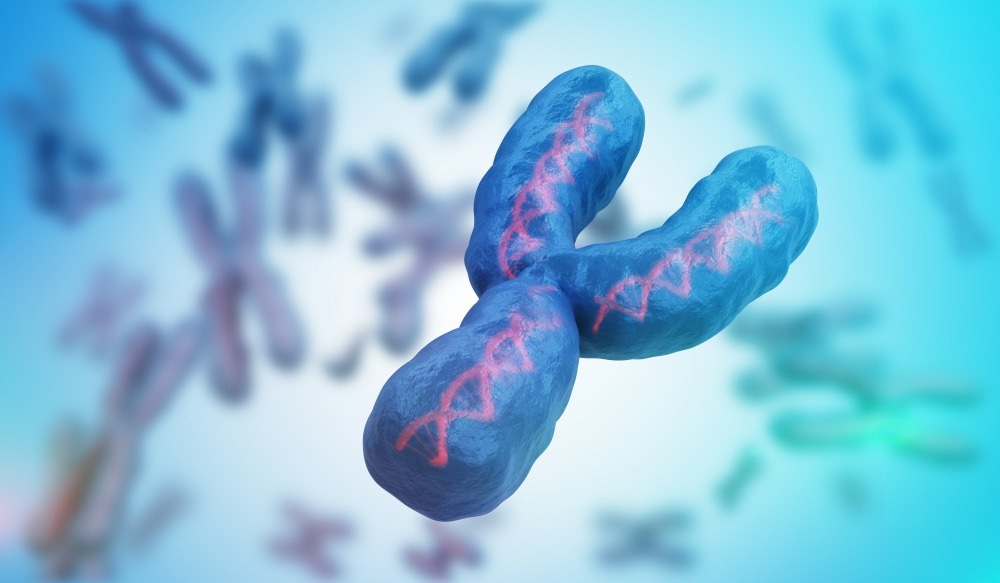More than 100 experts from across the world, including those from Johns Hopkins University, have worked together to completely sequence the Y chromosome, the final unsolved component of the human genome.

Image Credit: vchal/Shutterstock.com
The achievement completes the genetic code for the Y chromosome and reveals critical information that could provide a clearer insight into the chromosome’s involvement in male-specific development, fertility, and genetically driven disorders like cancer.
The study was published in Nature on August 23rd, 2023.
Now that we have this 100% complete sequence of the Y chromosome, we can identify and explore numerous genetic variations that could be impacting human traits and disease in a way that we weren’t able to do before.”
Dylan Taylor, Doctoral Candidate, John Hopkins University
The genes and genetic circuits that direct the growth and operation of all living cells are encoded by the DNA sequence that makes up chromosomes. Due to its repeated molecular patterns, the Y chromosome has proven particularly difficult to decode, but improved sequencing equipment and bioinformatics methods allowed scientists to resolve these DNA sequences.
The group found 41 new genes on the Y chromosome and revealed the family structures of genes that control sperm. Additionally, they revealed the genetic structure of genes considered to be crucial for the development and operation of the male reproductive system.
We completed the wiring diagram for all these genetic switches that get activated via the Y chromosome, many of which are critical to the genetic contributions to male development. We are at a point where scientists can start using this map. We were previously blind to different parts of the genome and different mutations, but now that we can see the whole genome, we hope we can add new insights to the genetics of a lot of different diseases.
Michael Schatz, Study Author and Bloomberg Distinguished Professor, Computer Science, Biology, and Oncology, Johns Hopkins University
Along with the X chromosome, the Y chromosome is frequently addressed for its function in sexual development. While these chromosomes play an important role, the variables involved in human sexual development are dispersed across the genome and extremely complicated, giving birth to the wide range of human sex characteristics observed in male, female, and intersex persons.
These are not the same as gender, which is a social category. Furthermore, current research shows that genes on the Y chromosome influence other elements of human biology, such as cancer risk and severity.
The National Human Genome Research Institute, a member of the Telomere-to-Telomere team that published the whole human genome sequence in 2022, conducted the study. This long-awaited discovery is anticipated to open up new avenues for molecular and genetic research.
However, two X chromosomes were used in that study. Now, the team created a comprehensive blueprint of the Y chromosome and every component of its DNA using a donor who has both an X and a Y chromosome.
The new discoveries provide the groundwork for high-quality genome assembly, including tailored genomes, that were not previously possible.
The genome is a very personal thing—it has the basic instructions for the building blocks of our development and what makes us human. We knew we had an incomplete picture up until now, but we can now see the entire genome from end to end for the first time.
Rajiv McCoy, Assistant Professor, Biology, John Hopkins University
The Johns Hopkins team matched the new Y chromosome DNA to the genetic information from thousands of individuals throughout the world. The new Y chromosome sequencing will facilitate future research on human DNA, according to their investigation, which also identified faults in the existing reference genome.
To learn more about the evolution of the Y chromosome and to examine clinically significant genes that could have an impact on personalized treatment for pancreatic cancer and other diseases, researchers are incorporating the new knowledge into studies of primates.
Source:
Journal reference:
Rhie, A., et al. (2023). The complete sequence of a human Y chromosome. Nature. doi.org/10.1038/s41586-023-06457-y